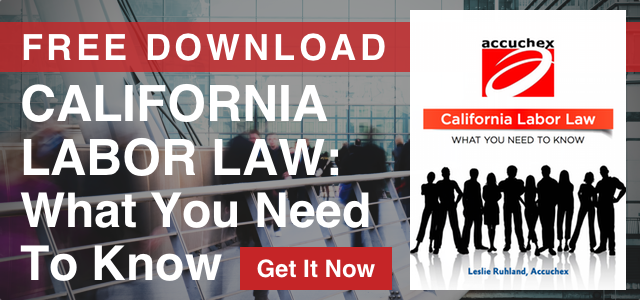Federal and California labor law changes have been challenging for employers trying to stay on top of new regulations.

Companies with employees in California should learn the new state law developments and trends, said Jonathan Siegel, an attorney with Jackson Lewis in Newport Beach, Calif.
Siegel noted recently during a concurrent session at the Society for Human Resource Management 2016 Annual Conference & Exposition that this has been a difficult year for HR professionals in California because there are so many changes, including several that took effect in July.
“Make sure you really dig into these issues and review them with your counsel so that you have a good idea of what’s going on” in the state, he said.
The new labor laws include issues of overtime pay, pregnancy leave, piece-rate pay, sick leave and more.
It is important for employers to know how the new federal overtime rules as well as new state and local paid-sick-leave laws will affect their HR policies and processes.
Policies for Doctors’ Notes, Kin Care and Sick Leave
Under the Healthy Workplaces, Healthy Families Act of 2014 (HWHFA) California employers must have sick-leave policies that are compliant with the state-mandated paid-sick-leave rules.
“One of the key frustrations about the law is that it doesn’t authorize employers to ask for a doctor’s note” for the 24 hours (or three days) of sick leave provided under the law, Siegel said. “That was a huge change for many employers because they had policies stating that an absence of three or more days requires a doctor’s note.”
Siegel also noted that if employers offer sick leave beyond what is mandated by the state, their policies should reflect changes to California’s kin care law that took effect January 1, 2016.
Prior to January 2016 the kin care law stated that if an employer offers sick leave, an employee may use half the time allotted to care for a child, parent, spouse, domestic partner or child of a domestic partner who is ill.
The new labor law now states that “employees are allowed to use half of the annual accrual for all the same reasons described” in the HWHFA and employer policies should reflect this.
Employers should also keep in mind that there are now many city and local sick-leave laws with various other requirements.
Federal Overtime Rules In Addition to State and Local Laws
Changes to the overtime provisions of the Fair Labor Standards Act (FLSA) finally went into effect in 2016. For the first time in over 20 years, the threshold salary for exempt employees is higher under the FLSA than under California law.
Beginning December 1, 2016, the minimum salary for exemption under the FLSA will be $47,476, and the threshold salary for highly compensated employees will be $134,004.
However, compliance in California isn’t as simple as following just the new federal regulations.
Since California doesn’t adopt the FLSA’s exemption for highly compensated employees, employers in the state shouldn’t rely on the federal rules. Additionally, although the FLSA allows employers to use certain incentive compensation to meet the minimum salary threshold, California law does not.
Employers should note that the state’s salary threshold is expected to exceed the FLSA’s once again in 2019. Gov. Jerry Brown recently signed a law that will gradually increase the state’s minimum salary for the overtime exemption. It is projected to reach $49,920 on Jan. 1, 2019, for many employers.
Local Laws Regarding Minimum Wage In Effect Now
Another issue that’s “flying below the radar is the proliferation of city minimum-wage laws,” Siegel said.
Some cities, including Los Angeles, San Francisco and Santa Monica, have new minimum-wage laws that went into effect on July 1, 2016.
Effective as of July 1, employers with 26 of more employees, must pay employees who perform at least two hours of work within the geographic boundaries of the City of Los Angeles within a particular week at least $10.50 for each hour worked.
Additionally, Los Angeles County’s equivalent minimum wage rate increase schedule also became effective on July 1, 2016. Under the Los Angeles County wage ordinance, for employers with 26 of more employees, $10.50 per hour must be paid to employees who perform at least two hours of work in a particular week within unincorporated areas of Los Angeles County.
Effective as of July 1, 2016, employees working at least two hours in a workweek in the City of San Francisco must be paid at least $13.00 for each hour worked. The new $13 hourly rate is an increase from $12.25 per hour.
Additionally, employers are required to post this new official notice in a conspicuous area informing employees of the increase.
It's important for employers to note that San Francisco’s local minimum wage in excess of the state minimum wage is one of several labor law-related ordinances that is unique to San Francisco. In addition, there are many others which provide rights and benefits that do not exist under California state law.
These local laws include San Francisco’s Paid Sick Leave Ordinance, Health Care Security Ordinance, Family Friendly Workplace Ordinance, Fair Chance Ordinance, Formula Retail Employee Rights Ordinance, and the Paid Parental Leave Ordinance.
Employers with employees working in San Francisco are should re-evaluate their existing policies and procedures to ensure that they comply with these ordinances.
All employers should review the city laws and determine what the new minimum wage is in their locations and how it will apply to their HR and payroll policies.
Helping You Stay In Compliance With California Labor Laws
If your organization would like to learn more about its obligations, or acquire resources to deal with these types of situations, Accuchex recently partnered with HR Solutions Partners to offer its customers the most up-to-date and professional human resources management solutions available.
To learn more about the different levels of Human Resource Management services available, please follow this link.
To learn more about California Labor Law, click on the button below to download our free guidebook.


